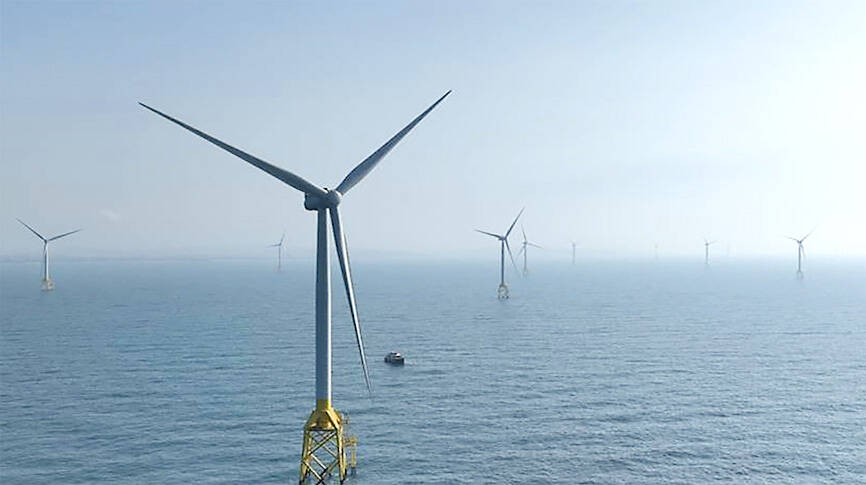Synera Renewable Energy Group (SRE, 風睿能源), a Taiwan-based offshore wind developer, is in talks over potential deals across Asia as it seeks to diversify beyond its home market.
The firm is holding discussions over acquisitions and investments with companies in South Korea, Japan and Australia, chief executive officer Anna Su (蘇容儀) said in an interview.
SRE is already involved in projects in Japan and will consider expanding into Southeast Asia next year, she said.

Photo: CNA
The move to diversify geographically comes as offshore wind projects globally struggle with the after-effects of the COVID-19 pandemic, including higher interest rates and surging inflation. In Taiwan, requirements that developers buy 60 percent of their equipment from local manufacturers have also pushed up costs. Japanese companies have been pulling out of projects in Taiwan.
Globally, costs in the offshore wind industry have risen about 50 percent on average this year, and this will continue to be a challenge, Su said.
Taiwan’s local content requirements make wind energy relatively more expensive, and many companies are unwilling to pay extra when electricity prices are heavily subsidized by the government, she said.
“You want green energy, but green energy does not come free,” Su said.
SRE is also “continuously watching” the Taiwan-China geopolitical situation, she said.
Su said she was still optimistic about wind power in Taiwan, particularly due to demand from the semiconductor chip industry, which could absorb about 6 gigawatts of capacity alone.
“Taiwan made a good decision to join the offshore wind industry early,” she said.

The US dollar was trading at NT$29.7 at 10am today on the Taipei Foreign Exchange, as the New Taiwan dollar gained NT$1.364 from the previous close last week. The NT dollar continued to rise today, after surging 3.07 percent on Friday. After opening at NT$30.91, the NT dollar gained more than NT$1 in just 15 minutes, briefly passing the NT$30 mark. Before the US Department of the Treasury's semi-annual currency report came out, expectations that the NT dollar would keep rising were already building. The NT dollar on Friday closed at NT$31.064, up by NT$0.953 — a 3.07 percent single-day gain. Today,

‘SHORT TERM’: The local currency would likely remain strong in the near term, driven by anticipated US trade pressure, capital inflows and expectations of a US Fed rate cut The US dollar is expected to fall below NT$30 in the near term, as traders anticipate increased pressure from Washington for Taiwan to allow the New Taiwan dollar to appreciate, Cathay United Bank (國泰世華銀行) chief economist Lin Chi-chao (林啟超) said. Following a sharp drop in the greenback against the NT dollar on Friday, Lin told the Central News Agency that the local currency is likely to remain strong in the short term, driven in part by market psychology surrounding anticipated US policy pressure. On Friday, the US dollar fell NT$0.953, or 3.07 percent, closing at NT$31.064 — its lowest level since Jan.

Hong Kong authorities ramped up sales of the local dollar as the greenback’s slide threatened the foreign-exchange peg. The Hong Kong Monetary Authority (HKMA) sold a record HK$60.5 billion (US$7.8 billion) of the city’s currency, according to an alert sent on its Bloomberg page yesterday in Asia, after it tested the upper end of its trading band. That added to the HK$56.1 billion of sales versus the greenback since Friday. The rapid intervention signals efforts from the city’s authorities to limit the local currency’s moves within its HK$7.75 to HK$7.85 per US dollar trading band. Heavy sales of the local dollar by

The Financial Supervisory Commission (FSC) yesterday met with some of the nation’s largest insurance companies as a skyrocketing New Taiwan dollar piles pressure on their hundreds of billions of dollars in US bond investments. The commission has asked some life insurance firms, among the biggest Asian holders of US debt, to discuss how the rapidly strengthening NT dollar has impacted their operations, people familiar with the matter said. The meeting took place as the NT dollar jumped as much as 5 percent yesterday, its biggest intraday gain in more than three decades. The local currency surged as exporters rushed to